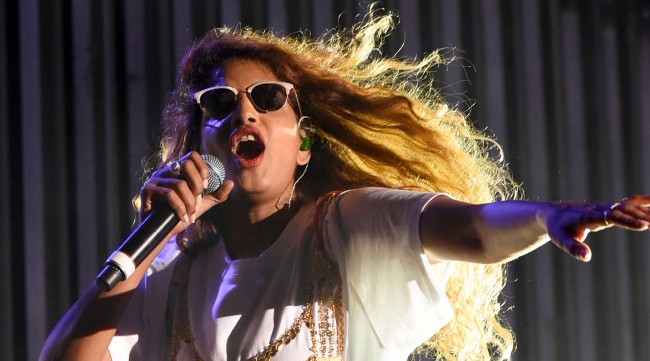
M.I.A. has been accused of more anti-blackness over a tweet of hers about — of all people — Harvey Weinstein. She wrote, “Can you imagine if the music industry Harvey Weinsteined people? Especially number one genre in pop — hip hop!” She immediately incurred a firestorm of reactions from followers who were quick to remind her that she is “a guest in hip-hop” and implore her to “let black folks sort that out.”
One user tweeted that “A lot of female pop artists have experienced this sh*t so it’s not exclusive to the hip-hop and rap music industry.” Which is true. While rap and hip-hop have their fair share of icky controversies over toxic comments about women and a general attitude of misogyny and sexism, Kesha and Dr. Luke could hardly be considered hip-hop stars in any sense.
One of the more interesting responses came from writer/activist Jamilah Lamieux, who unleashed a thread calling M.I.A.’s tweet a prime example of “Black women’s problems,” saying that M.I.A’s “anti-Blackness has been clocked and noted long ago” and asking, “The default for predator, in the middle of a white man’s scandal, is still Black men?”
https://twitter.com/JamilahLemieux/status/918805145064038402
Then she shared her point of view: “When Black men ARE predators, who do they usually victimize? Black women. And speaking of, the most notorious music industry predator that EYE [sic] know of is, of course, R. Kelly. This anti-Black, non-Black, mother of a Black child makes that comment and I’m immediately inclined to defend our men because that’s what Black women do. Meanwhile, white women are weeping and wailing over Ben Affleck grabbing a boob but had no time for R. Kelly’s victims. I’m tired of standing in solidarity with women+men who don’t show up for Black women.”
https://twitter.com/JamilahLemieux/status/918813277739773953
Despite the slowly changing demographic makeup, hip-hop is still a “Black” genre, whose dominant figures and the majority of performers remain people of color. The demographics may be slowly changing, but attacks on rap will still be seen by many as attacks on African-American men and women. While M.I.A. does make a point that hip-hop has become the most popular music in America, its problems are not exclusive to it — they’re always going to reflect the state of life in America, just like any other genre of music.
The full thread referenced above can be found below.
https://twitter.com/JamilahLemieux/status/918804280181739521
https://twitter.com/JamilahLemieux/status/918805145064038402
https://twitter.com/JamilahLemieux/status/918805554373496832
https://twitter.com/JamilahLemieux/status/918806022713741312
https://twitter.com/JamilahLemieux/status/918806862270750721
https://twitter.com/JamilahLemieux/status/918807743947042816
https://twitter.com/JamilahLemieux/status/918808150647754753
https://twitter.com/JamilahLemieux/status/918808671425126402
https://twitter.com/JamilahLemieux/status/918809265330106368
https://twitter.com/JamilahLemieux/status/918809774971596800
https://twitter.com/JamilahLemieux/status/918810287997845504
https://twitter.com/JamilahLemieux/status/918810644002099200
https://twitter.com/JamilahLemieux/status/918811446909206528
https://twitter.com/JamilahLemieux/status/918811884228313094
https://twitter.com/JamilahLemieux/status/918812772544245762
https://twitter.com/JamilahLemieux/status/918813277739773953
https://twitter.com/JamilahLemieux/status/918814553055678465






